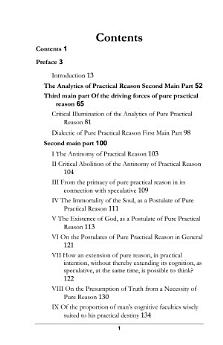Critique of Practical Reason
mai 2024 · Minerva Heritage Press
Carte electronică
108
Pagini
family_home
Eligibilă
info
reportEvaluările și recenziile nu sunt verificate Află mai multe
Despre această carte electronică
A new translation of Immanuel Kant's famous "Critique of Practical Reason", one of his three core critiques, from the original German manuscript first published in 1788. This new edition contains an afterword by the translator, a timeline of Kant's life and works, and a helpful index of Kant's key concepts and intellectual rivals. This translation is designed for readability, rendering Kant's enigmatic German into the simplest equivalent possible, and removing the academic footnotes to make this critically important historical text as accessible as possible to the modern reader. Kants 1788 Critique of Practical Reason is the second of his major triad of critical philosophical critiques. It builds upon his Pure Reason and the Groundwork for the Metaphysics of Morals in delineating his theory of moral justification. The Critique of Pure Reason answers the question, "What can I know?", while Practical Reason answers "what should I do?". Practical Reason primarily concerns the relationship of Reason to morality. It is the Imperative in the Categorical Imperative. Morality is not a feeling or perception, but a reality to submit to. Kant's Practical Reason is a critical text to understand the view of Reason as Teleological, a uniquely German view, in contrast to the English Empiricist view (Hume, Locke, and Descartes) view is that Reason is the slave of the passions and can tell us nothing about morality and ethics. The teleological view, which is found clearly and explicitly in Kant and all German Idealists after him, is both normative and descriptive, or in other words, Imperative. The entire Frankfurt school of thought operates off of a version of this metaphysical view, all the way to Theodor W. Adorno's Aesthetics which is rooted in a Teleological view of reason.
Despre autor
Immanuel Kant (1724-1804) was a German philosopher whose work in epistemology, ethics, and metaphysics shaped the course of Western philosophy. In his landmark work, Critique of Pure Reason, Kant proposed "transcendental idealism," asserting that human knowledge is limited by the mind's structures, which mediate our understanding of reality. This "Copernican revolution" in philosophy argued that we can only know phenomena (appearances) and not noumena (things-in-themselves). In Critique of Practical Reason, Kant introduced the "categorical imperative," a foundational principle in ethics that calls for actions to be universally applicable. Kant's focus on autonomy, moral duty, and rationality laid the groundwork for modern ethical and political thought, and his ideas continue to influence fields such as philosophy, law, and cognitive science, positioning him as a central figure in the Enlightenment.
Evaluează cartea electronică
Spune-ne ce crezi.
Informații despre lectură
Smartphone-uri și tablete
Instalează aplicația Cărți Google Play pentru Android și iPad/iPhone. Se sincronizează automat cu contul tău și poți să citești online sau offline de oriunde te afli.
Laptopuri și computere
Poți să asculți cărțile audio achiziționate pe Google Play folosind browserul web al computerului.
Dispozitive eReader și alte dispozitive
Ca să citești pe dispozitive pentru citit cărți electronice, cum ar fi eReaderul Kobo, trebuie să descarci un fișier și să îl transferi pe dispozitiv. Urmează instrucțiunile detaliate din Centrul de ajutor pentru a transfera fișiere pe dispozitivele eReader compatibile.








